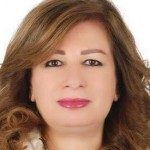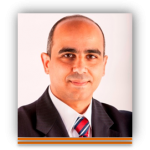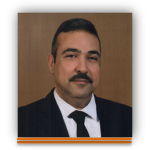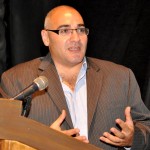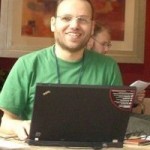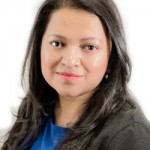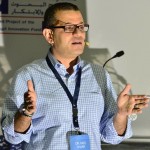Program
AMECSE 2016 Tentative Program. Stay Tuned for the Final Program.Registration
AMECSE 2016 Welcome & Opening Session
H.E. Eng. Yasser El Kady,Minster of Communications and information Technology
Ms. Asmaa Hosny, ITIDA CEO
Dr. Hossam Osman, Conference Chair
Dr. Haitham Hamza, Program chair
Software Engineering, What And Why
Abstract
Real Time Predictive Analytics for Social Media
Abstract
Coffee Break
Big Data, Fog Computing, and the New Experience Economy
Abstract
Paper Parallel Sessions
| Hall 1Track 1: Software Quality and Verification | Hall 2Track 2: Data and Semantic Software Engineering | Hall 3Track 3: Software Requirements and Modeling | Hall 4Short Papers: Poster Short Presentations |
|---|---|---|---|
Chair: Amr Kamel (Information Technology Industry Development Agency (ITIDA), Egypt)
Yasser Ghanim (Software Engineering Competence Center, Egypt)
Ghada Bahig (Mentor Graphics & American University in Cairo, Egypt); Amr A El-Kadi (The American University in Cairo, Egypt)
Asmaa Anwar, Mohamed (Information Technology Industry Development Agency (ITIDA) & Software Engineering Competence Center (SECC), Egypt); Amr Kamel (Information Technology Industry Development Agency (ITIDA), Egypt); Elmohanned Ahmed (Link Development, Egypt) |
Amal Yassien and Amr Desouky (German University in Cairo, Egypt)
Sameh S. El-Atawy (Accorpa, LLC, Alexandria, Egypt); Mohamed E Khalefa (Faculty of Engineering, Alexandria University, Alexandria, Egypt)
Tarek Ali (ISSR & ISSR, Egypt); Eman Nasr (Independent Researcher, Egypt); Mervat Gheith (Cairo university, Egypt)
Kamal Bassuony, Mostafa Gaber, Shaimaa Lazem and Karim Youssef (City for Scientific Research and Technological Applications, Egypt); Mohammed Farag (Faculty of Engineering, Alexandrian University, Egypt) |
Mohamed Ali (Researcher at Institute of Statistical Studies and Research, Cairo University, Egypt)
Nour Azmy (BMB Solutions & Networkers International, Egypt); Islam El Maddah (Ain Shams University, Egypt); Hoda Korashy (Thesis Supervisor, Egypt)
Fatma Mihany (Faculty of Computers and Information & Cairo University, Egypt); Hanan Moussa (Faculty of Computer and Information, Egypt); Amr Kamel and Ehab Ezzat (Faculty of Computers and Information, Cairo University, Egypt); Muhammad Ilyas (University of Sargodha, Pakistan)
Mustafa Mohamed (ITIDA-SECC, Egypt); Hadeel ElAdawy (Helwan University, Egypt) |
Ahmed F. Fahmy (University of Ain Shams & STC, Saudi Arabia)
Mohamed Ali (Researcher at Institute of Statistical Studies and Research, Cairo University, Egypt); Eman Nasr (Independent Researcher, Egypt)
Ahmed Fahmy Abdel Hafiz El Sayed (Ahmed Fahmy Abdel Hafiz El Sayed)
Ahmed Gamaleldin and Mahmoud Abdallah (SECC, Egypt) |
Lunch Break
Panel 1: Distributed Software Development: Potentials, Pitfalls, and Myths
- David Parnas, McMaster University, Canada and University of Limerick, Ireland
- Hesham Shokry, Lero, Ireland
- Hesham Arafa, Valeo, Egypt
- Alain Chesnais, Canda
- Okwu Marcus, AFICTA, Nigeria
Be Disrupted or Transform
Abstract
Africa and Software of Things: Engaging the Knowledge Olympiad
Abstract
Unleashing the Power of Data-Driven Innovation and Entrepreneurship in the MENA Region
Abstract
Bringing Higher Value from your off-shore Development Center Through Innovation
Abstract
Coffee Break
Tutorials Parallel Sessions
| Hall 1 | Hall 2 | Hall 3 | Hall 4 |
|---|---|---|---|
|
FUNCTIONAL AND REACTIVE PROGRAMMING FOR SCALABLE ARCHITECTURES – PART 1 |
Lunch Break
Panel 2: Open Data and Open Innovation: The Catalysts for Entrepreneurship
- Hossam Abdelgawad, Cairo University, Egypt
- Raed M. Sharif, IDRC, Egypt
- Rasha Tantawy, TIEC, Egypt
- Ali Rebaie, Data Science Advisor, UAE
- Johan Arvling, Knowledge Management and Innovation Advisor, Egypt
- Mohamed Maher, Head of enterprise and ICT Etisalat, Egypt
Closure Cermony
Best Paper Award, Guests Honoring, Hack4Community Open Data Hackathon Winners


